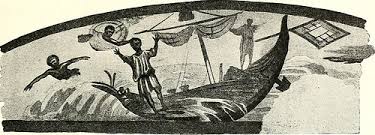
Stephen
Terry, Director

Journey
to Rome
Commentary
for the September 29, 2018 Sabbath School Lesson
 “Last night an angel of the God to whom I belong and whom I
serve stood beside me and said, ‘Do not be afraid, Paul. You must stand trial
before Caesar; and God has graciously given you the lives of all who sail with
you.’” Acts 27:23-245-6, NIV
“Last night an angel of the God to whom I belong and whom I
serve stood beside me and said, ‘Do not be afraid, Paul. You must stand trial
before Caesar; and God has graciously given you the lives of all who sail with
you.’” Acts 27:23-245-6, NIV
Finally, after approximately two years of protective
captivity in Caesarea, Paul is sent to Rome by sea. Sea travel in the first
century was by no means a simple matter. In the days of sail, the ships were at
the mercy of the prevailing winds which could range all the way from stagnating
doldrums to violent tempests. Cargoes might be thrown overboard when ships were
taking on water from the angry waves in an attempt to keep the vessel afloat.
But lives as well as cargoes could be lost to the storms as the ships
floundered and descended, broken, to the ocean floor. Even seeking shelter from
a storm could be deadly as ships nearing safety might be thrown upon the rocky
shoals surrounding otherwise safe harbors. This is why so many first century
ships were dedicated to the various pagan gods in hopes that their influence
would bring the ship safely to port.[i] It seems that man has long
felt that he could control the gods by his actions. Even though we have
replaced the pagan pantheon with monotheism, we often still do this, believing that
if we do this then God must do that. We prefer to have control as opposed to
letting God simply lead us where he will. Instead of asking, “God what would
you have me to do?” we prefer to make our plans and then offer to dedicate some
portion of it to God in an effort to secure his endorsement. In so doing, we
can reduce God to a level lower than our own intellect. Little wonder then that
when those plans come to naught, we gently ease God right on out of the picture
as irrelevant because he didn’t come through for us on the contract that we
imposed upon him. Much of atheism and even agnosticism may be founded upon such
controlling behaviors. They do not work well in marriages. They are even less
likely to be helpful in our relationship with God. It is often called presumption.
Paul may have presumed too much when he journeyed to
Jerusalem. Though warned several times by others, who had received visions,
about what might happen, he stubbornly persisted. Perhaps he felt that he was
returning to the same Jerusalem he had left years before. But things had
changed, the church had moved deeper into schism between the Pauline theology
that would welcome Gentiles without circumcision and the Jacobine theology[ii] that still valued Jewish
practices, including circumcision, over those of the Gentiles. Jerusalem was a
boiling cauldron of conflict over the two perspectives. From a Seventh-day
Adventist perspective, it would be similar to an ordained female administrator seeking
to bring a petition before the Annual Council of the General Conference. The
hostility, if not openly vocalized would nonetheless permeate the atmosphere of
every conversation. The fact that James would require Paul to demonstrate through
sacrifices in the temple just which side of the controversy he belonged to is
evidence of how serious the schism had become. This may be why God was trying
to warn Paul away from Jerusalem. But because Paul had been rescued so many
times before, he may have felt he had a special dispensation to do whatever he
wished and God would bail him out if necessary. To some extent that may have
been true when he was bringing Jesus to the Gentiles, but that does not necessarily
mean that bringing money to Jerusalem would grant him the same protection.
If Paul was traveling to Jerusalem, hoping for a pat on
the head for all he had achieved like he experienced before, he was mistaken. When
the voice of God is giving us direction for our way, it can often be a mistake
to make an effort to curry favor from others who may not have an understanding
of what God has called us to do. They may even see our desire for their
approval as an opportunity to seize control of the work we have been called to
do. If we seek their approval, we may be granting them greater favor than God
who called us. In any event, Paul’s excursion to Jerusalem ended up costing him
about five years of active ministry as he languished in captivity, awaiting the
emperor’s leisure to hear his case. The corrupt legal system of Paul’s day had
little desire to impose speedy justice unless the wheels of jurisprudence were
adequately oiled by money.[iii] Paul might have availed himself
of that kind of justice but for two reasons. First, it would have been further
submitting the gospel to the control of the state, and second, he likely gave
all the funds he brought with him to the church in Jerusalem. As was noted last
week, Luke does not indicate in Acts that the Jerusalem church did anything to
assist Paul. This would not be surprising since from their perspective, Paul may
have been seen to be on the wrong side of the Jew versus Gentile controversy.
They may even have felt that Paul’s imprisonment would silence those voices
advocating for the Gentiles. It may have been a dark time for the church, not
simply because of the persecution of Christians, but also because of their own
internal squabbles as the two factions struggled for power. We might even
wonder whether or not the interference the Jewish Christians of Jerusalem were to
the work of taking the gospel to the world could have been one of the
precipitating factors that removed any protection God might have extended to protect
the temple from destruction in 70 C.E. Jesus had warned his followers in
advance.[iv] History often repeats
itself, and the Judaizing Christians may have made themselves as odious to God
as the Jews of 6th Century B.C.E. had done when the temple had
previously been destroyed.
But there is a lesson in Paul’s experience for each of
us today. In spite of his missteps and in spite of the political intrigues
within the church, God did not abandon Paul. Paul’s actions in captivity revealed
that he understood that point clearly for he continued to share the gospel
while captive with kings, governors and anyone who would listen. He and those
with him also experienced the miraculous intervention of God when all might
have lost their lives on the shoals of Malta. He also experienced salvation from
the bite of a poisonous viper while on the island. Perhaps the greatest lesson
he learned from his experience though was that he was not dependent upon
blessings from Jerusalem. His was truly an independent ministry with God
leading the way. This helped to give him boldness to speak out, not because of
his intellect,[v]
but because he spoke from actual experience of walking in God’s will and the
help and deliverance that such a walk can provide. Despite every challenge,[vi] he continued to carry the
gospel forward.
Paul was eventually freed by the emperor, but years later was executed in Rome on a subsequent charge. One
may wonder why Luke ended his account when he did in the book of Acts since
Paul’s life was spared and he went on to minister for several more years.. There may be several reasons. One obvious reason may be
that once Paul was imprisoned it was the perfect opportunity to write about his
adventures while things were moving at a slower pace. Once Paul was freed, his
frenetic pace would have resumed and with more urgent, pressing needs, writing
may have taken a back seat. As a writer, I understand very well how that can
happen. Another reason may be that Luke was a Gentile Christian and as the
Judaizers gained power with the church in Jerusalem, it might have been more
circumspect to “lay low.” If Paul were seen as a heretic by those in Jerusalem,
writing about him could have been seen as a seditious act. This may not fit
with the perspective of those who date the writing of Acts to a decade or more
after the destruction of the temple. However, such a late date provides no discernable
motive for omitting Paul’s second imprisonment and the events that took place
between the two incarcerations. Perhaps it is important to remember that books,
rather scrolls, were not published with copyright dates in order to precisely date
them. And the writing of enough copies to achieve widespread dissemination
could take decades, depending on available materials and scribes. Also, in order
to have such excellent recollection of all the details, there may have been an earlier
“working” copy or diary to maintain a record. Therefore, first century dates
for the compositions created by members of the early church tend to be specious
at best. Out of an abundance of caution, maybe too much caution, scholars tend
to ascribe later dates rather than earlier to these documents. Adding to the dilemma,
many of these documents underwent some modification as well-meaning scribes and
church leaders sought to harmonize the various accounts. We see that even
today, as various translations seek to clarify understanding. Fortunately, as
time has gone on, the texts available to compare with and translate from have
been closer and closer to the original events, providing greater accuracy in
determining what has been omitted and what has been added by later writers.
But lest we get hung up in minutiae, the point of Acts is
to reveal the efforts made to disseminate the gospel early on and the support
God gave to those early believers. That support has not waned. If it appears
that it has, it may not be because God has changed but rather our willingness
to place our faith in Him has. If that is the case, I would invite each reader
to consider reaching out sincerely to God and seeing if he answers. The Bible tells
us “…anyone who comes to him must believe that he exists and that he rewards
those who earnestly seek him.” Hebrews 11:6b, NIV
